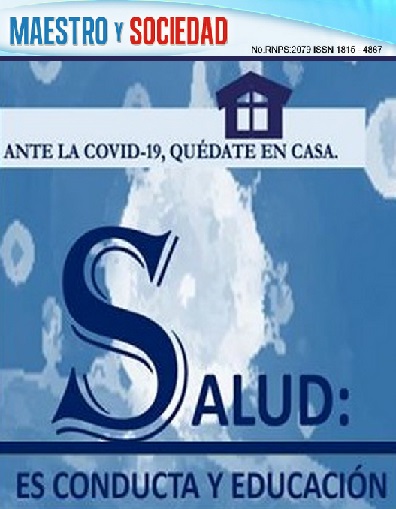Array Array
Array
Palavras-chave:
Array, ArrayResumo
ArrayReferências
2. Aranda S., I (2018). La formación sociolaboral desde la educabilidad de la autoestima. [Cd-Rom].
3. Aznar, P. (2002). La escuela y el desarrollo humano sostenible: retos educativos a nivel local. Teoría de la Educación, 14, 151-183.
4. Campaner, G., y De Longhi, A. (2007). La argumentación en Educación Ambiental. Una estrategia didáctica para la escuela media. Reec, 6(2), 442-446.
5. Coca B., N., Morales, P., y Álvarez I., M. (2019). La educación especial en las escuelas especiales. Revista EDUSOL. Universidad de Guantánamo.
6. González, E. (2003). ¿Réquiem por un sueño? La educación ambiental en riesgo. Revista Agua y Desarrollo Sustentable, 1, 19-22.
7. Lucas, A. (1972). Environment and Environmental Education: Conceptual issues and Curriculum Implications. (PhD Dissertation). Ohio State University, Ohio, Unit States of America.
8. Perales P., F. J. (2017). Educación Ambiental y Educación Social: el punto de vista de los estudiantes. Granada: Universidad de Granada.
9. Quintana A., R. F. (2009). El “verdadero” guardian del oro verde verde, estudio etnobotánico en la comunidad indígena de Macedonia. (Tesis de licenciatura). Universidad Distrital Francisco José de Caldas, Bogotá, D. C., Colombia.
10. Quintana A., R. F. (2016). Reconfiguración simbólica del territorio en una comunidad Indígena Amazónica. Revista Chilena de Antropología Visual, 22, 91-114.
11. Quintana A., R. F. (2015). Etnodesarrollo y medio ambiente: el conocimiento tradicional como estrategia para fomentar el desarrollo sustentable y la identidad cultural de la comunidad indígena Tikuna del alto amazonas, Macedonia. (Tesis de maestría). Universidad Distrital Francisco José de Caldas, Bogotá, D.C., Colombia.
12. Quintana A., R. F. (2015). La escuela occidental: mediadora de estabilidad territorial al revalorizar el universo indígena. Bío-Grafía, 8(14), 50-75.
Publicado
Como Citar
Edição
Seção
Licença
Esta revista proporciona un acceso abierto inmediato a su contenido, basado en el principio de que ofrecer al público un acceso libre a las investigaciones ayuda a un mayor intercambio global de conocimiento. Cada autor es responsable del contenido de cada uno de sus artículos. Los artículos pueden ser inéditos o estar disponibles previamente en servidores de preprints reconocidos por la revista. Sin embargo, no se permite la duplicación de la publicación o traducción de un artículo ya publicado en otra revista o como capítulo de un libro.
This journal provides immediate open access to its content, based on the principle that providing the public with free access to research supports a greater global exchange of knowledge. Each author is responsible for the content of each of their articles. Articles may be previously unpublished or available on preprint servers recognized by the journal. However, duplication of publication or translation of an article already published in another journal or as a book chapter is not permitted.
Esta revista oferece acesso aberto imediato ao seu conteúdo, com base no princípio de que oferecer ao público acesso gratuito à pesquisa contribui para um maior intercâmbio global de conhecimento. Cada autor é responsável pelo conteúdo de cada um de seus artigos. Os artigos poderão ser inéditos ou estar previamente disponíveis em servidores de preprints reconhecidos pela revista. No entanto, não é permitida a duplicação de publicação ou tradução de artigo já publicado em outro periódico ou como capítulo de livro.



























 Universidad de Oriente
Universidad de Oriente 